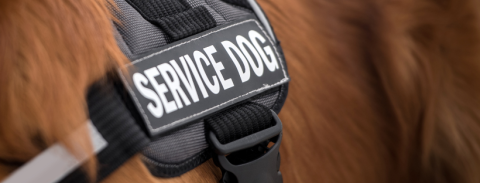Contacts
Washington State Human Rights Commission
www.hum.wa.gov
1-800-233-3247
Northwest ADA Center
Toll-free: 800-949-4232
nwadactr@uw.edu
Videophone (VP): 425-233-8913
nwadacenter.org

Laws and Rules on Service Animals and Emotional Support Animals
- Use of a Trained Service Animal In Employment
- Use of a Trained Service Animal In Public Accommodation
- Service Animal Brochure
- U.S. Department of Justice Freqently Asked Questions About Service Animals & the ADA
Housing
The U.S. Department of Housing and Urban Development (HUD) is a federal agency that administers the Fair Housing Act (FHA). Under the FHA, a service animal is defined as an animal that is a necessary reasonable accommodation for a person with a disability. Emotional support animals and comfort animals ARE included in the HUD definition and are therefore allowed into a person's dwelling.
There should be no "pet fee" for the service animal. The person with the disability must request the animal as a reasonable accommodation for the disability, and must be able to show that the animal is necessary because of the person's disability.
How to Find an Animal:
- There is no accrediting body to monitor organizations who train service animals in the State of Washington. Assistance Dogs International (ADI) is an organization whose mission it is to ensure a service animal organization does adhere to quality standards where "dogs are treated humanely, clients are treated with respect and dignity and training is delivered in a professional way at all times.” If you are considering a service animal organization as a resource then the information shared at the ADI website (http://www.assistancedogsinternational.org/members/accreditation/) may be of value to your decision-making process.
- Companion Animal Adoption Programs:
Points to Keep In Mind
- Service animals are not pets, so a "no pets" policy does not apply
- Service animals will often be identified with a harness or vest, but there is no requirement that the service animal have any identification
- Businesses cannot ask the customer about his or her disability and cannot ask for proof of disability.
- A service animal should remain in physical or voice control of its handler at all times; it should not urinate or defecate inside, be disruptive or aggressive.
Where to go for More Information About Training, Laws and Rules:
If you need additional information, have additional questions, or wish to have training for your organization, please contact the Washington State Human Rights Commission at 360-753-6770 or 800-233-3247 (TTY 800-300-7525). Additional information on this and other civil rights issues can be found on our website at www.hum.wa.gov
Washington State Human Rights Commission
www.hum.wa.gov or toll free 1-800-233-3247
“A neutral, law enforcement agency that can explain the law regarding service animals and provide technical assistance.”
Northwest ADA Center
Toll-free: 800-949-4232
Email: nwadactr@uw.edu
Videophone (VP): 425-233-8913
Website: nwadacenter.org
Washington State Office of the Attorney General
Service Animals Rights and Responsibilities / En Español

